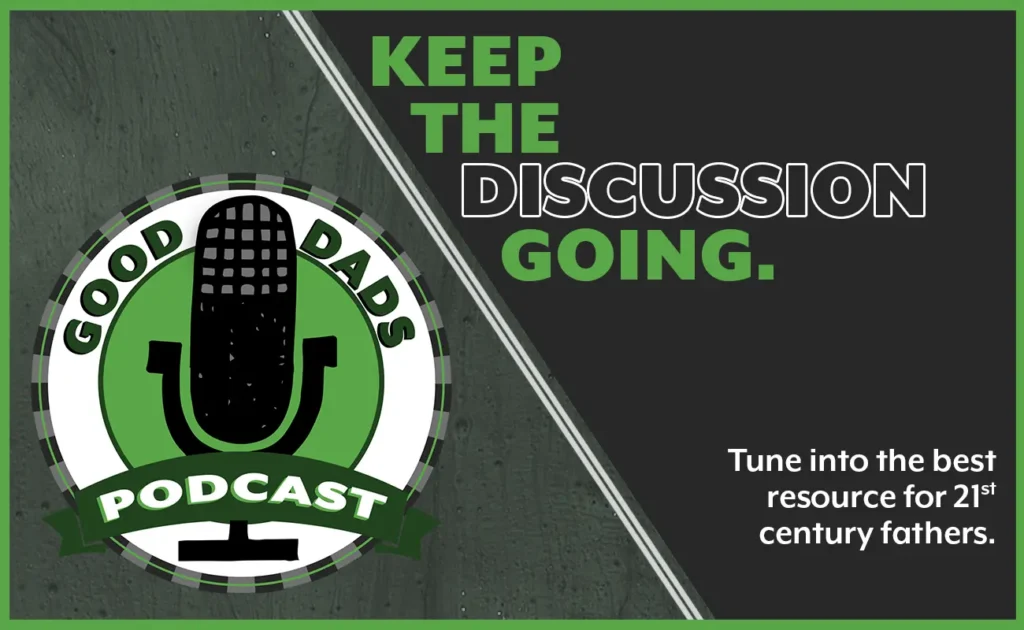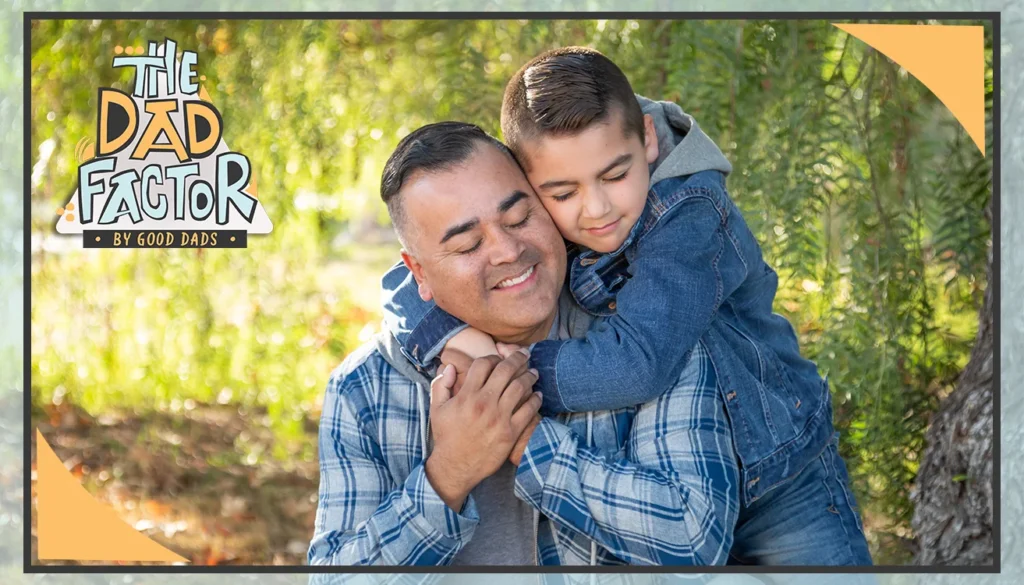Most dads hope to raise kind, generous children who care for others. Most parents want to see their children playing well with others, practicing kindness and developing meaningful relationships. But when your toddler just yanked a toy out of her brother’s hands with a yowl of “MINE!” or when your teenager just slammed his bedroom door for the hundredth time, kindness can feel like miles away.
This week on the Dad Factor blog, Good Dads spoke with Dr. Sarah Jean Baker, an early childhood expert, to offer insights and wisdom on kindness: how to impart it to our youngsters, how to cultivate it in everyday life and how dads can live by example.
Sarah Jean Baker PhD is an Assistant Professor in the Early Childhood Program, in the School of Teaching, Learning, and Developmental Studies in the College of Education at Missouri State University. She earned her PhD in School Improvement from Texas State University. She has experience working in public schools as an early childhood teacher—teaching kindergarten and first grade—as well as leading schools. Her research interests include teacher preparation and teacher development for social justice and culturally sustaining pedagogy, early childhood education, and women’s issues in schools. She is a proud mama to four children and often finds her greatest joys and struggles in her mama identity.
How can dads raise kind children? How might dads lead by example? Why are children so mean sometimes? Dr. Baker shares her experiences and insights to challenge some negative preconceptions about kindness while offering concrete advice for how to get started with a fresh perspective.
Despite popular beliefs, kindness isn’t always inherent
It may seem odd to think of kindness as a skill, but Dr. Baker says it’s just like any other developmental trait. Kindness is something children must learn through action, observation and words.
Her advice is to always assume a positive intent. Remind yourself, as a dad, that very young children don’t know how to do everything yet. Ideas like gratitude, selflessness and kindness can be developed. And remember: Developmental skills don’t blossom overnight. Consistent, repetitive efforts on the part of the parent are what generate success.
“It’s a challenge for parents, because it’s like, ‘I already said that,’ and yes, you will have to say that multiple, many, hundreds of times!” Dr. Baker said.
Children are ego-centric. It doesn’t mean you’re failing as a parent!
Don’t expect perfection from yourself or your children. The reality is that children aren’t going to be kind all the time, Dr. Baker said. Our brains are hard-wired to fear for our own safety and to be concerned about securing food and shelter. When a child snatches a toy or cries about something being “unfair,” don’t be discouraged. Think of it as an opportunity to teach about compassion.
And when your children are kind, foster that.
Part of your job as a dad is to help children truly see others. Encourage your children to see beyond themselves and their own world. Dr. Baker says that a parent’s ability to instill in kids the capacity to see and understand others in the earliest stages of childhood development lays important ground work for success as the youngster grows up.
Dr. Baker suggested dads use the Q-Tip Method—that is, Quit Taking It Personally! This is a huge challenge in any care-giving role, she said, because we give so much of ourselves to child-rearing but don’t get anything in return in the moment. That’s not because children are malicious; it’s because they aren’t wired that way. So next time your child is acting out, don’t take it personally. Remind yourself that children make mistakes, and their mistakes are not an indication of who you are as a parent.
When we take that step back and stop taking things personally, Dr. Baker says, “it helps us be more compassionate and understanding.” When we can refrain from interpreting something as a personal attack, like a child’s tantrum or a teenager slamming their bedroom door, we’ll be less likely to jump to the defensive.
Call attention to the kindness you see, and put words to actions
When you see your child do something kind, call it out, and so often, Dr. Baker said. It is very helpful for children (from youngsters all the way up through teenagers) when their parents label behaviors.
This might look like:
· “I saw you share your markers during drawing time. That was very kind! It is so nice when you share.”
· “You picked up your toys after dinner. That was so kind and helpful!”
That positive reinforcement, Dr. Baker says, is an important parenting habit for two reasons. One: Labelling what we see helps children make sense of the world. Two: It gives us a chance to pause and recognize all that our children are doing right.
The secret ingredient for learning about kindness: play
Much of the current research points to the importance of play in strong development in children, Dr. Baker said. Dads should engage with their children, especially through imaginative play or “playing pretend.” She advised dads to get down to their kiddo’s level by sitting on the ground to play.
Because children learn through play, this provides ample opportunity to learn about kindness. Use role play, like playing with dolls, as an opportunity to talk about what might be a kind response to a given situation. For example, say one doll hits another. Talk about ways to handle that. Through this form of play, children can learn about their bodies, understand habits, and develop their own thinking skills and self-regulation skills, Dr. Baker said.
Another example of incorporating kindness into play is through following rules. When dads and children can roleplay a scenario where kindness is a theme, it can offer a safe chance to learn. Say, for instance, one doll cuts in line or takes something that isn’t theirs. By building these real-life scenarios into play, you’re offering the chance to learn about and practice kindness.
Read stories together about kindness—and read picture books multiple times
“I turn to literature for my own children and for my students,” Dr. Baker said. When you observe a problem with your youngster, she advised finding a book that tackles the same problems.
The first time you read the book together, read just for enjoyment, Dr. Baker said. During subsequent readings, dads can begin to ask questions, talk about the book’s illustrations or discuss what a character might be feeling. What might be a different way to respond to the events in the book? What would you do if you were in this character’s shoes?
Each read-through can offer new insights and takeaways, and because children learn through repetition, these different perspectives can help connect meanings, Dr. Baker said.

LEARN MORE: E520-Child-Rearing as a Team Event | With Dr. Sarah Jean Baker
How dads can model kindness for their families
One of the greatest gifts dads can give their children is modelling kindness every day, Dr. Baker said. Think about how you are responding to those around you, she suggested. Everyone, including children, learns from doing more than just talking about it.
How you treat your children—even when they’re frustrating—is crucial. In Dr. Baker’s view, it’s all about “showing kindness, care and love.”
Give your children opportunities to demonstrate kindness
Recognize that acts of kindness will look different as children grow. For very young children, drawing a picture with Dad is an easy and inexpensive example. For bigger kids, invite them to help with cooking and baking, mowing the lawn in the summer, raking leaves in the fall or shoveling snow in the winter. Observe what resonates best with them and run with that.
Make it collaborative
Ask your children to help you brainstorm acts of kindness, and execute them together. Ask: Who do you want to be generous to today? How should we do that?
Start in your immediate vicinity
Dr. Baker says you don’t have to drive to the local soup kitchen to be kind.
“There are people already in your life around you who can benefit from your kindness,” she said. “You don’t have to go far.”
Take a cup of tea to a neighbor. Rub Mom’s feet. Leave a sticky note with an encouraging message for a sibling.
Use home as an arena for kindness
Practice small, simple forms of kindness around the house. For very young children, picking up their toys around the house is a perfect way to demonstrate responsibility for one’s belongings and care for others in a shared space.
Carry on the momentum into school
Once your child has had some practice with demonstrating kindness at home, encourage them to carry that to school for their peers and educators. Writing a kind note to a teacher, baking cookies for the principal or creating a drawing for a friend are some examples.
Talk to your children when you make mistakes
If Dad can own up to it when he does something unkind, that’s huge, Dr. Baker said.
“It humanizes parents,” she said. “We aren’t perfect, and part of being human is making repairs.” It’s crucial for parents to come back and re-visit after a mistake.
For example, dads might say: “I was unkind earlier today. It was not my intention to be short with you, and I will do my best to act differently next time.”
Recognize domestic labor as kindness
“Another huge example is for dads to recognize what Mom is doing in the home,” Dr. Baker said, stressing that research continues to show that women consistently do much more housework than men, even when families are trying to make the distribution of house labor more equal.
Dr. Baker says her husband calls out kindness within earshot of their teenage boys, and she hopes that habit will impact their sons for years to come.
“It’s so kind that your mom did your laundry for you,” Dr. Baker’s husband might say. “That was so nice of her to put your clothes away. How kind of Mom to buy your favorite fruit snacks for your lunch box!”
Dr. Baker’s advice: If you live with a partner, acknowledge the work this person puts into running the home. Do not expect domestic labor is “just something that women do.”
Complimenting your partner and showing appreciation through verbal feedback, especially when the kids might overhear, is critical to healthy development, Dr. Baker says. When parents work well together, it normalizes what a healthy relationship looks like, and children will look for that in a future partner.
“Kindness” means something different to everyone. Don’t be afraid to do some soul-searching.
Kindness can be difficult to define, says Dr. Baker, because it can encompass so much. In her house, she wants her family members to always be asking themselves how they can make someone else’s life easier or brighten their day. In her family, she wants generosity to be the norm.
She encouraged Good Dads readers to think carefully about what kindness might mean in your household. What are you capable of doing to demonstrate kindness? What are your values? Find what works best for you.
Remember: kindness is cyclical and generational
When parents are kind to each other, and when dads teach kindness to their kids, your genetic code can be changed, Dr. Baker said. These acts can be very healing for parents, she says, because it doesn’t just impact you: It impacts your children, and your children’s children.
In Dr. Baker’s view, the more dads can show up for their children, the better. For example, when you can sit down with your child when she’s having a hard time and share in those feelings, your daughter will identify that later in life as kindness.
She will take that kindness she received from her dad and put it out into the world.
The Dad Factor by Good Dads dives into important fatherhood topics and explores how intentional fatherhood makes a big difference for children, families and entire communities. For more free resources from Good Dads, subscribe to our e-newsletter (view the footer of this webpage to sign up).





